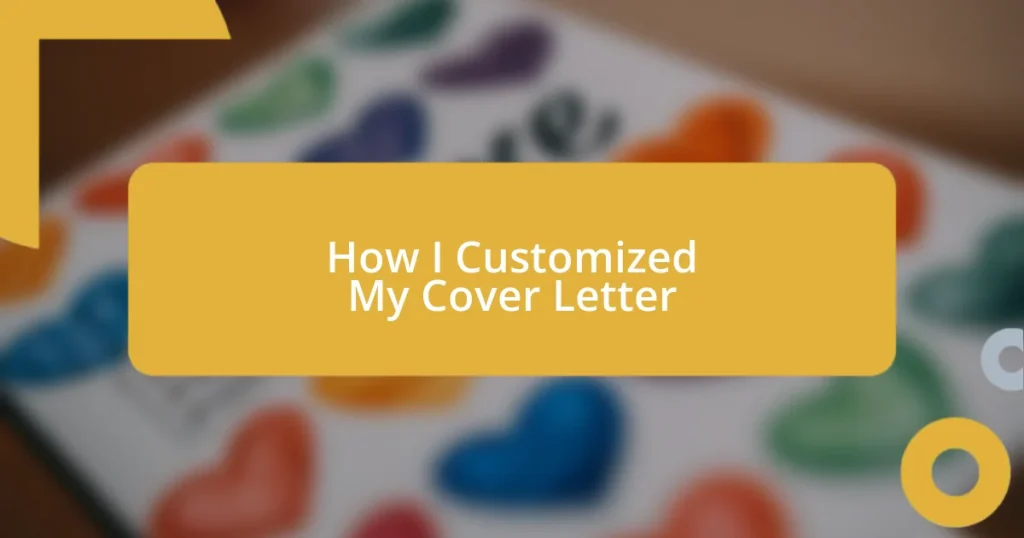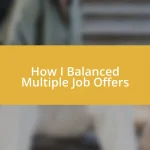Key takeaways:
- Tailor your cover letter for each job by researching the employer’s values and aligning your experiences with their mission.
- Use a captivating opening statement, personal anecdotes, and specific achievements to engage the reader and demonstrate your qualifications.
- Proofread thoroughly, focus on proper formatting, and seek feedback from others to enhance the clarity and impact of your letter.

Understanding Cover Letter Basics
A cover letter serves as your personal introduction to potential employers. It’s not just a formality; it’s your opportunity to showcase your personality and enthusiasm for the position. When I first started crafting my cover letters, I treated them like a mere summary of my resume, but I soon realized that the letter is a chance to speak directly to the employer and articulate why I’m a great fit for their team.
Every cover letter should be tailored to the specific job you’re applying for. I remember one time customizing a letter for a job that almost felt like I was writing a love letter to the company. I actually researched their values and mission, then reflected on my own experiences that aligned perfectly with theirs. This strategy made my application stand out, and it’s a reminder of how powerful targeted content can be.
Don’t forget to include a compelling narrative about your journey or accomplishments that led you to this point. Ask yourself: what drives me? When I shared a specific story about overcoming a challenge in my previous job, it not only highlighted my skills but also showcased my resilience and character. It created an emotional connection that a simple list of achievements could never accomplish.

Researching the Employer’s Needs
When researching the employer’s needs, I find it immensely valuable to dive deep into their company culture and values. For instance, I once applied to a startup that emphasized innovation and collaboration. I spent hours scouring their website, reading employee testimonials, and analyzing their social media presence. This not only helped me align my experiences with their mission but also enabled me to use their specific language in my cover letter, making it feel more authentic.
Understanding the job description is crucial too. I recommend taking a highlighter to key responsibilities and qualifications that resonate with your skills. During my last application, I noticed that they mentioned a preference for agile project management experience. Gladly, I had spearheaded several agile projects in my previous role. By detailing this in my cover letter, I created a direct connection between what they were asking for and what I could provide, which really enhanced my chances of getting an interview.
Furthermore, don’t underestimate the power of talking to current or former employees. A simple coffee chat can yield insights that you won’t find elsewhere. In my experience, when I reached out to a former employee of a company I was interested in, I learned about a specific project they were proud of. I was able to weave that narrative into my cover letter, demonstrating my genuine interest and understanding of what the employer values most.
| Research Strategies | Benefits |
|---|---|
| Company website | Learn about values and culture |
| Job description analysis | Identify key requirements |
| Networking with employees | Gain insider perspectives |

Crafting a Compelling Opening Statement
Crafting a captivating opening statement can truly set the stage for your entire cover letter. I reflect on a time when I began my letter with a gripping personal anecdote that illustrated my passion for the industry. This approach not only drew in the reader but also allowed me to express my enthusiasm right from the start. A solid opening can provoke curiosity and create a connection that keeps hiring managers engaged.
To ensure your opening statement resonates, consider these key elements:
- Personalization: Address the letter to a specific person, if possible. It feels more direct and meaningful.
- Enthusiasm: Express genuine excitement about the role and the company. Use vivid language that reflects your emotions.
- Unique Hook: Start with an engaging fact or personal story that relates to the job. This can set you apart from others immediately.
By weaving these elements together, you can craft an opening that captures attention and reflects your individuality, making a memorable first impression.

Highlighting Relevant Achievements
Highlighting relevant achievements in your cover letter is essential to demonstrate your suitability for the role. For instance, when applying for a sales position, I highlighted a time when my team exceeded our quarterly sales targets by 150%. I explained the strategies I implemented, which not only showcased my results but also my proactive approach to overcoming challenges. This specific example likely resonated with the hiring manager, making my application stand out.
Another memorable achievement I mentioned was when I led a project that streamlined internal processes, reducing turnaround time by 30%. I shared how this initiative saved the company considerable resources and improved team morale. By quantifying my achievements, I provided a clear picture of my impact, making it easier for the employer to envision me in the role.
It’s amazing how powerful it can be to share not just what you’ve accomplished but how those accomplishments align with the potential employer’s goals. Have you ever considered how experiences that seem small can actually speak volumes? For example, I recounted how revitalizing a struggling marketing campaign resulted in a significant boost in engagement. That moment showed the hiring manager not just my capability but my potential value to their team. This is how you create a narrative that connects your past successes directly to the opportunity at hand.

Personalizing the Closing Paragraph
When I reached the closing paragraph of my cover letter, I realized how crucial it was to leave a lasting impression. I often reflect on a time when I concluded with a sincere statement about my eagerness to contribute to the team. I expressed my enthusiasm for the possibility of collaborating with such a talented group. This feeling brought my application full circle, connecting my passion with the role.
It’s all about tying the themes you’ve presented earlier together. For instance, after detailing my successful initiatives in past roles, I mentioned how I was particularly excited about the opportunity to bring that same energy and innovation to the prospective company. It not only reiterated my qualifications but also created a shared vision of what we could achieve together. Don’t you think that’s a powerful way to engage a hiring manager?
Also, consider inviting further discussion. I’ve often included a line urging the reader to reach out if they have any questions or require additional information. This simple gesture can feel like an open door, inviting a two-way conversation. When I did this, it transformed my closing from a mere conclusion into an engaging invitation, showcasing my eagerness to connect further. Isn’t that the kind of interaction we all want?

Proofreading and Formatting Tips
After I’ve tailored my cover letter, I always give it a thorough proofreading session. I can’t emphasize enough how crucial it is to read your letter aloud. When I do this, I can catch awkward phrasing or typos that I might not see when reading silently. Have you ever noticed how some errors just jump out when you hear the words? It’s like a magic trick that reveals what the eye might miss.
Formatting is equally important. I remember spending some time tweaking the layout to ensure my letter was visually appealing. A clean, professional appearance adds credibility to your words. Simple adjustments like using consistent font sizes, proper margins, and sufficient spacing can make your letter easier to read and understand. It’s like dressing up for the occasion—first impressions matter, right?
Finally, seeking a fresh set of eyes can be a game changer. I often ask a friend or mentor to review my cover letter. Their feedback often unveils elements I hadn’t considered. Don’t you think that having someone else’s perspective can really elevate your work? A fresh perspective can provide valuable insights that enhance clarity and impact, ensuring your letter shines through the rest.















